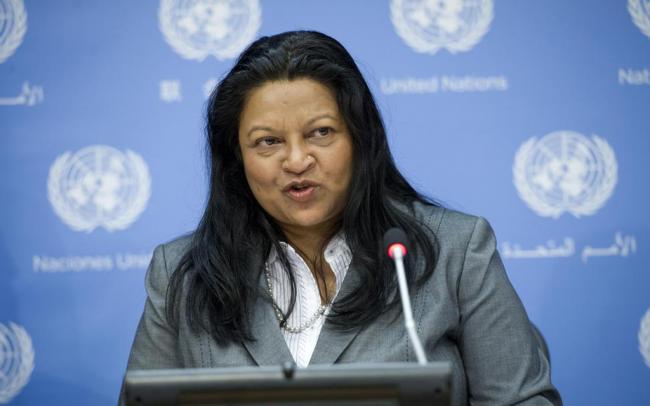
New UN report details litany of human rights violations, 'rule by fear' in Eritrea
The report by the UN Commission of Inquiry on Human Rights in Eritrea cites a raft of violations – some, it says, which may constitute crimes against humanity – of “a scope and scale seldom witnessed elsewhere,” according to a press release issued Tuesday.
“With the end of the Commission’s investigations and the publication of this report detailing our findings on human rights violations in Eritrea, I look forward to a renewed commitment by the international community to address the justice deficit and to support our call for a restoration of the rule of law,” affirmed Sheila B. Keetharuth, the UN Special Rapporteur on the situation of human rights in Eritrea, who also serves on the Commission.
“Rule by fear – fear of indefinite conscription, of arbitrary and incommunicado detention, of torture and other human rights violations – must end.”
The Commission’s report details numerous incidences in which Eritrea’s “initial promise of democracy and rule of law” following its independence in 1991 has been “extinguished” by the Government under the pretext of national defence.
Examples, it notes, include the severe curtailing of rights and freedoms as well as violations in the areas of extrajudicial executions, torture, national service and forced labour.
In addition, a system of mass surveillance, a “completely deficient” administration of justice, and “ubiquitous” arbitrary detention contribute to the pervasive terror encountered by Eritreans on a daily basis.
“The commission finds that the use of torture is so widespread that it can only conclude it is a policy of the Government to encourage its use for the punishment of individuals perceived as opponents to its rule and for the extraction of confessions,” the report continues. “Monitoring of detention centres is non-existent and perpetrators are never brought to justice.”
The widespread abuses allegedly faced by many in the Horn of Africa nation have prompted hundreds of Eritreans to flee their home country in search of asylum in Europe.
According to the latest estimates produced by Italian authorities, 32,000 Eritreans were rescued in 2014 as they attempted to traverse the Mediterranean – the majority of all migrants rescued by Italy’s comprehensive Mare Nostrum operation.
Meanwhile, the UN refugee agency has placed the number of Eritreans under its concern outside the country at more than 357,400.
“In desperation, they resort to deadly escape routes through deserts and neighbouring war-torn countries and across dangerous seas in search of safety. They risk capture, torture and death at the hands of ruthless human traffickers,” adds the Commission’s report. “To ascribe their decision to leave solely to economic reasons is to ignore the dire situation of human rights in Eritrea and the very real suffering of its people. Eritreans are fleeing severe human rights violations in their country and are in need of international protection.”
The Commission – appointed last September by the Geneva-based UN Human Rights Council in what the Office of the High Commissioner for Human Rights (OHCHR) then described as a “historic moment”– is composed of Mike Smith of Australia and Victor Dankwa of Ghana, as well as Keetharuth.
As independent experts or special rapporteurs, they are appointed by the Geneva-based Council to examine and report back on a country situation or a specific human rights theme. The positions are honorary and the experts are not UN staff, nor are they paid for their work.
UN Photo/Amanda Voisard
Support Our Journalism
We cannot do without you.. your contribution supports unbiased journalism
IBNS is not driven by any ism- not wokeism, not racism, not skewed secularism, not hyper right-wing or left liberal ideals, nor by any hardline religious beliefs or hyper nationalism. We want to serve you good old objective news, as they are. We do not judge or preach. We let people decide for themselves. We only try to present factual and well-sourced news.







